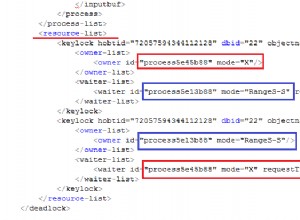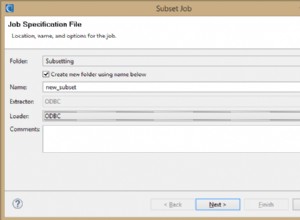C'est un coup dans le noir parce que nous ne connaissons pas vraiment vos données, mais si vous aimez votre requête existante, il peut être possible de simplement l'utiliser deux fois mais avec une clause where comme celle-ci :
SELECT
-- Common stuff?
ISNULL(Sales.ActivityId, Other.ActivityId), ISNULL(Sales.ScheduledStart, Other.ScheduledStart), ISNULL(Sales.OwnerIdName, Other.OwnerIdName), ISNULL(Sales.AccountIdName, Other.AccountIdName), ISNULL(Sales.new_ContactPersonName, Other.new_ContactPersonName), ISNULL(Sales.[Subject], Other.[Subject]), ISNULL(Sales.new_ColderNotes, Other.new_ColderNotes)
-- Sales stuff?
, Sales.AccountId, Sales.ContactId, Sales.SystemUserId, Sales.OptionalOwner, Sales.OptionalContact, Sales.OptionalAccount, Sales.PartyId, Sales.ParticipationTypeMask, Sales.RequiredContact, Sales.RequiredAccount, Sales.RequiredOwner, Sales.new_BusinessUnit
-- Other Stuff?
, Other.AccountId, Other.ContactId, Other.SystemUserId, Other.OptionalOwner, Other.OptionalContact, Other.OptionalAccount, Other.PartyId, Other.ParticipationTypeMask, Other.RequiredContact, Other.RequiredAccount, Other.RequiredOwner, Other.new_BusinessUnit
FROM
(
SELECT DISTINCT
Appointment.ActivityId, Appointment.ScheduledStart, Appointment.OwnerIdName, Contact.AccountIdName, Appointment.new_ContactPersonName,
Appointment.Subject, Appointment.new_ColderNotes, Account.AccountId, Contact_1.ContactId, SystemUser.SystemUserId, SystemUser.FullName AS OptionalOwner,
Contact_1.FullName AS OptionalContact, Account.Name AS OptionalAccount, ActivityParty.PartyId, ActivityParty.ParticipationTypeMask,
Contact_1.FullName AS RequiredContact, Account.Name AS RequiredAccount, SystemUser.FullName AS RequiredOwner, Account.new_BusinessUnit
FROM
Contact AS Contact_1 RIGHT OUTER JOIN
Account RIGHT OUTER JOIN
SystemUser RIGHT OUTER JOIN
Appointment INNER JOIN
ActivityParty ON Appointment.ActivityId = ActivityParty.ActivityId ON SystemUser.SystemUserId = ActivityParty.PartyId ON Account.AccountId = ActivityParty.PartyId ON
Contact_1.ContactId = ActivityParty.PartyId LEFT OUTER JOIN
Contact ON Appointment.new_ContactPerson = Contact.ContactId
-- Limit this part to Sales?
WHERE ParticipationTypeMask BETWEEN 1 AND 3
) as Sales
FULL OUTER JOIN
(
SELECT DISTINCT
Appointment.ActivityId, Appointment.ScheduledStart, Appointment.OwnerIdName, Contact.AccountIdName, Appointment.new_ContactPersonName,
Appointment.Subject, Appointment.new_ColderNotes, Account.AccountId, Contact_1.ContactId, SystemUser.SystemUserId, SystemUser.FullName AS OptionalOwner,
Contact_1.FullName AS OptionalContact, Account.Name AS OptionalAccount, ActivityParty.PartyId, ActivityParty.ParticipationTypeMask,
Contact_1.FullName AS RequiredContact, Account.Name AS RequiredAccount, SystemUser.FullName AS RequiredOwner, Account.new_BusinessUnit
FROM
Contact AS Contact_1 RIGHT OUTER JOIN
Account RIGHT OUTER JOIN
SystemUser RIGHT OUTER JOIN
Appointment INNER JOIN
ActivityParty ON Appointment.ActivityId = ActivityParty.ActivityId ON SystemUser.SystemUserId = ActivityParty.PartyId ON Account.AccountId = ActivityParty.PartyId ON
Contact_1.ContactId = ActivityParty.PartyId LEFT OUTER JOIN
Contact ON Appointment.new_ContactPerson = Contact.ContactId
-- Limit this part to Other?
WHERE ParticipationTypeMask BETWEEN 4 AND 6
) AS Other ON Sales.ActivityId = Other.ActivityId -- More cols for join?




